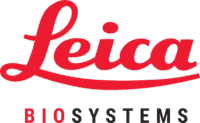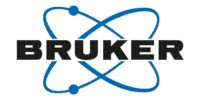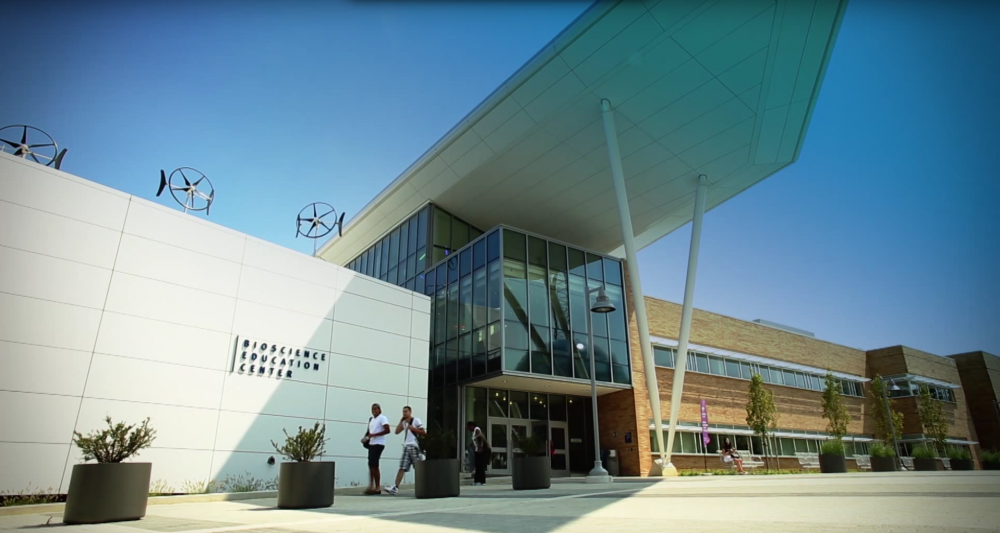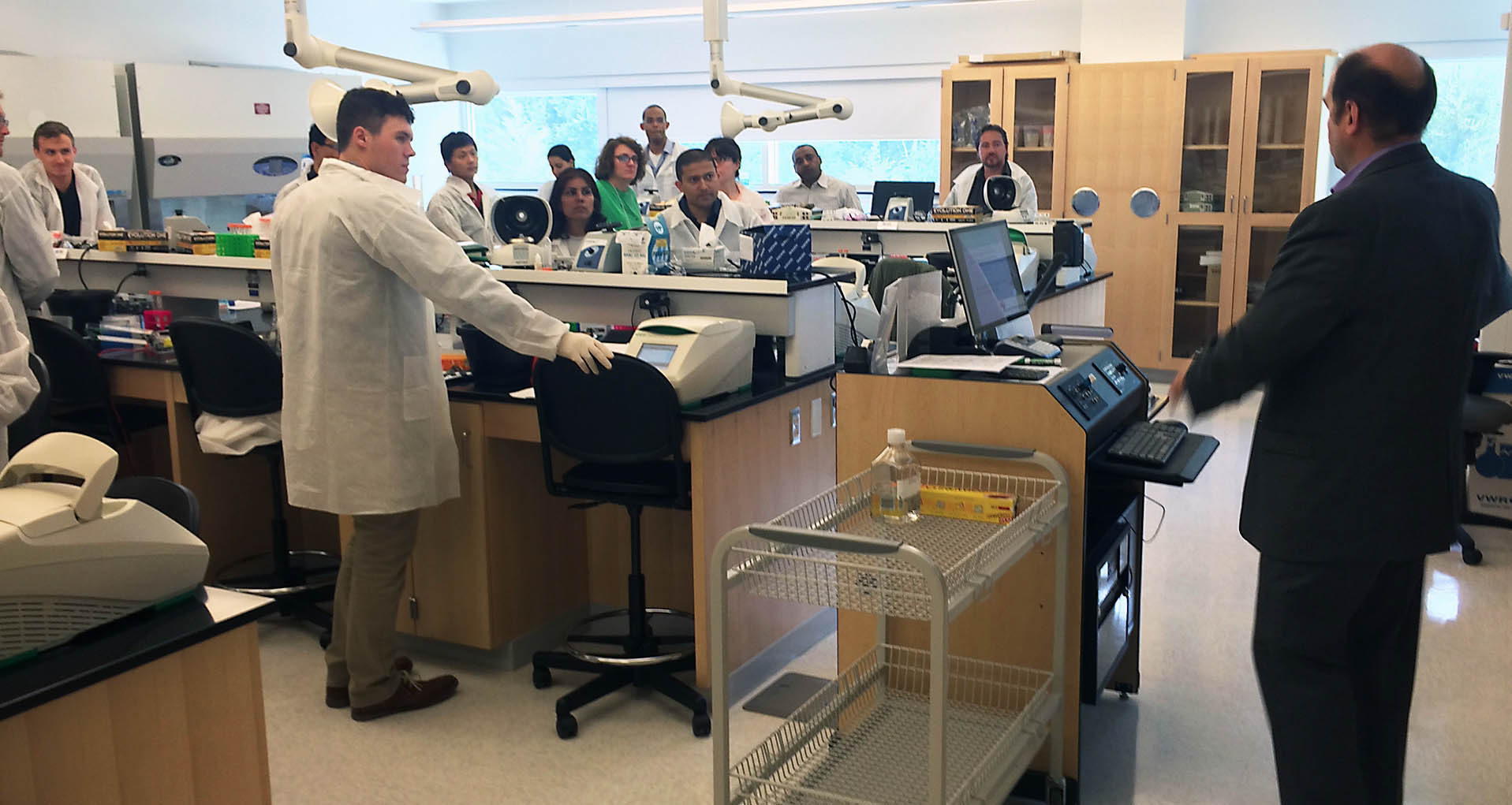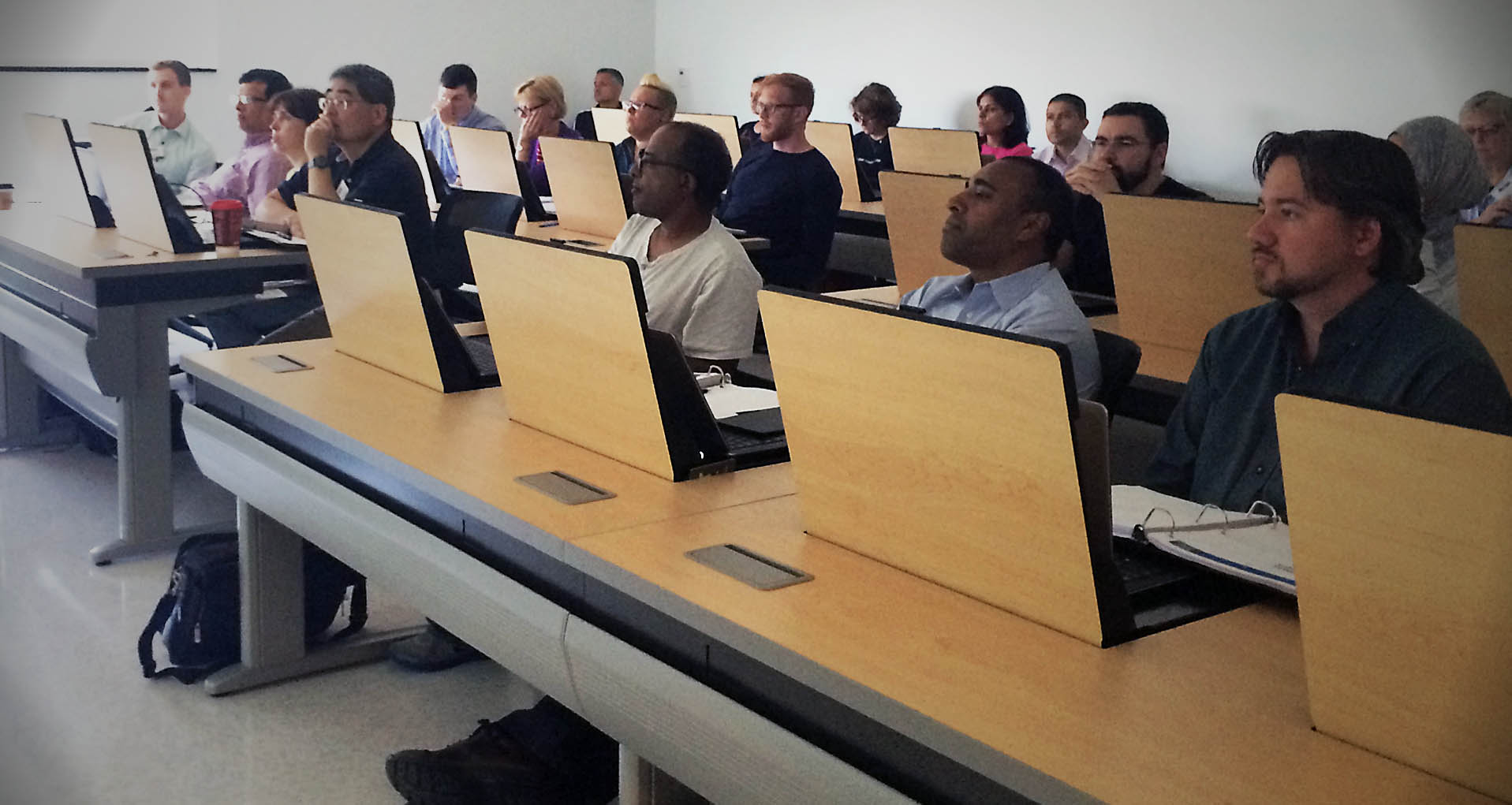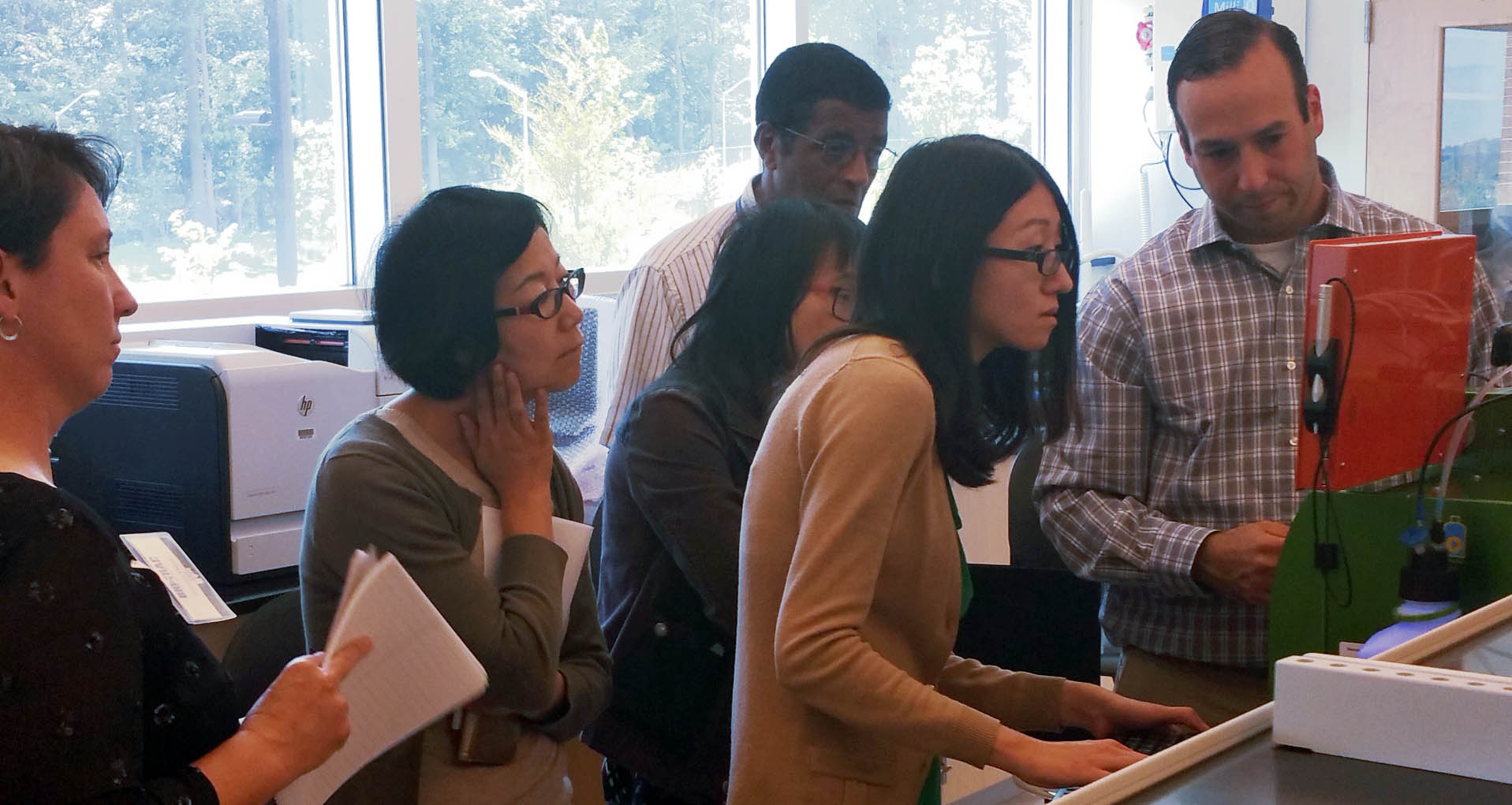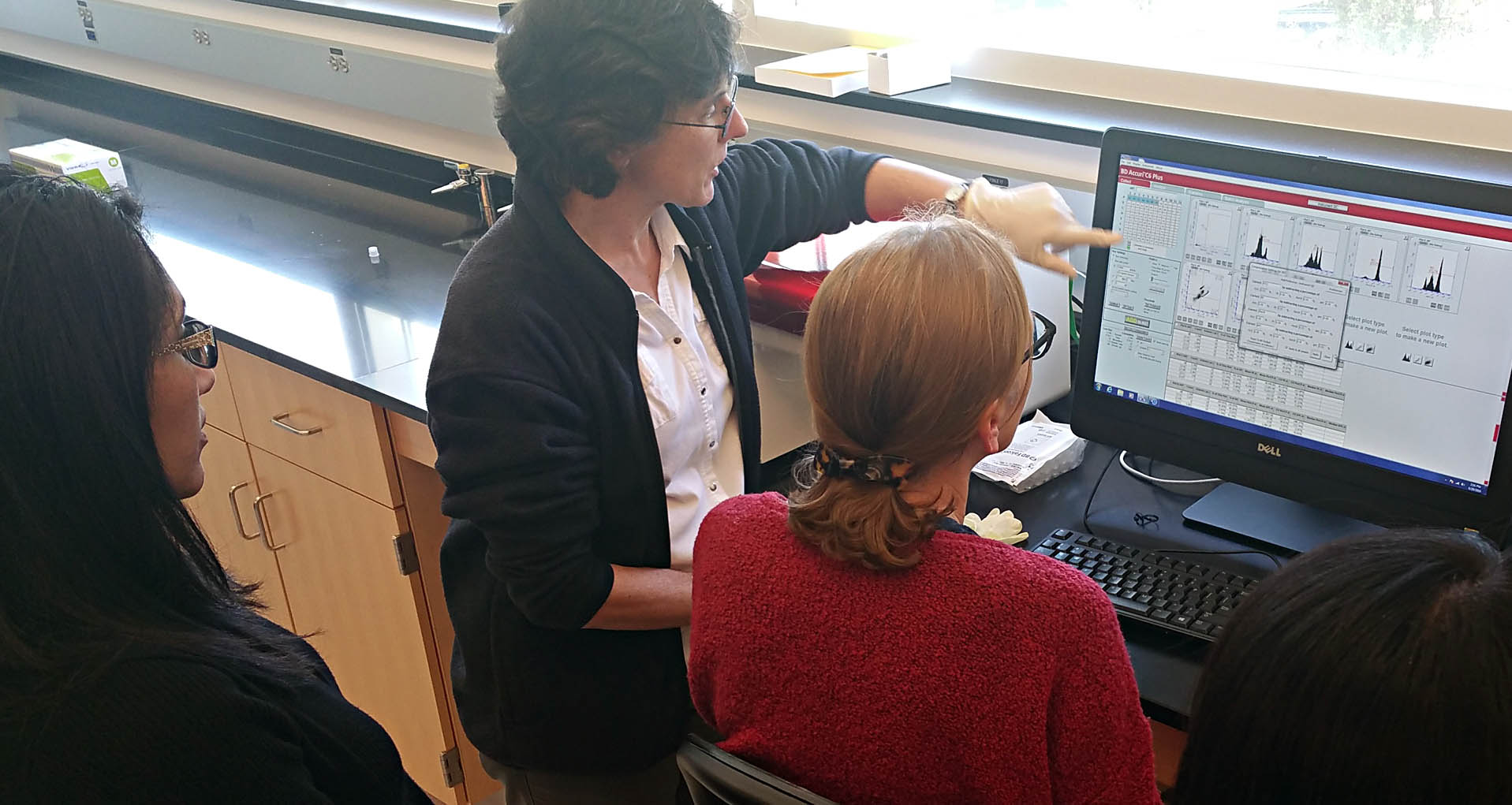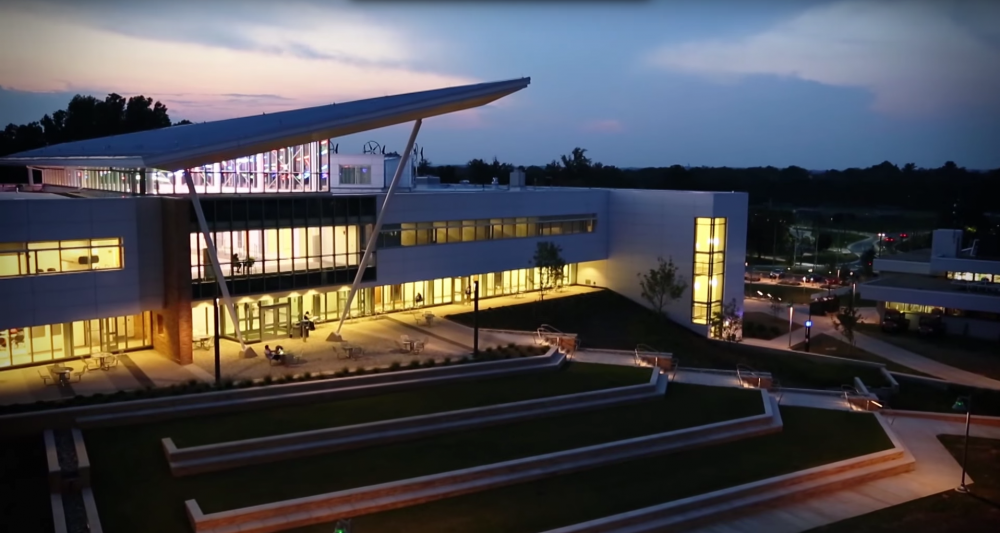September 15-16, 2025
Monday-Tuesday
Germantown, MD
The Bioscience Education Center
9:00am-5:00pm
1 Hour Lunch Break
This exceptional in-person Spatial Biology event features esteemed experts from multi-omics, pathology, spatial biology, multiplex immunofluorescence, artificial intelligence, and translational medicine to explore the latest advancements in the field. Focused on predictive and prognostic models, this gathering offers captivating presentations and insightful discussions.
 | Symposium Lecture Series |
 | All attendees receive a thumbnail drive with comprehensive workshop materials. |
 | Symposium Participants: 85 |
 | $695 |
-
"It is well organized workshop. Instructors are knowledgeable and helpful. The course mainly focuses on DNA methylation and its related techniques. If it is the field you are interested in, I recommend this course."
Shale Lei
University of Nebraska Omaha
Advances in Epigenetics 1/17
-
"Amazing learning experience. I made new friend, learned new knowledge and made further collaborations. It was worth attending this workshop."
Dhananjay Gupta
University of Vermont
Advances in Epigenetics 1/17
-
"The instructors for the “Advances in Epigenetics” were outstanding."
Jim DeWille
Ohio State University
Advances in Epigenetics 1/17
-
"This is a very well organized program. Lectures always convey the most advanced knowledge and technologies. Hands-on practice is also very helpful. Highly recommend to colleagues in or out of NIH community."
Guangpu Shi, M.D.
Research Fellow, NEI/NIH
iPSC: Reprogramming, Differentiation and Gene Editing with CRISPR 8/16
-
"I highly recommend this course to someone who seek opportunities for epigenetics research and analysis. Presenters and lectures are very nice and experts in this field."
Bongsoo Park
Johns Hopkins School of Public Health
Advances in Epigenetics 1/17
-
"Bio-Trac offers wonderful workshops that provide up-to-date, useful technological information and knowledge important for my research applications."
Thuy Phung, MD, PhD
Baylor College of Medicine
NGS 10/16
Monday, September 15, 2025
8:00 AM Coffee
9:00 AM Opening Remarks: Mark Nardone, Michael Surace
9:20 AM Keynote: "From Data to Discovery: Integration and Analysis of Multi-Modal Data”
Sizun Jiang, PhD, Harvard Medical School
10:00 AM Session 1
From Data to Discovery: Integration and Analysis of Multi Modal Data Practical Skills Session for Postdocs and Students
- Eldad Shulman PhD; NIH/NCI/CDS: AI-driven Spatial Transcriptomics Unlocks Large-scale Biomarker Discovery from Histopathology.
- Lindsey Erion-Barner, PhD; Broad Institute of MIT Spatial Transcriptomics at Scale for Immunology Profiling Across Diverse Mouse Tissues
- Maureen Carey, PhD, Tempus; Multiomic Characterization of Response to Cancer Immunotherapies
11:00 AM Coffee & Vendors Morning Session
11:40 AM Session 2
Exploring Novel Biomarker Discovery Techniques: Latest Methodologies in Biomarker Identification Multiomics Approaches for Comprehensive Insights
- Jessica L. Baumann, MD; Medical Director, Leica The Next Era of Immunohistochemistry: The Evolution of IHC into a Precision Diagnostic
- Chakra Chennubhotla, PhD. PredxBio; Distilling Highly Accurate, Low-plex, Minimal Signatures from Ultra-high-plex Spatial Data for Predicting the Probability of Immunotherapy Response
- Axel Heinemann PhD; CEO Resolve Biosciences
- Claudio Gouveia Roque, PhD, New York Genome Center; Differential Cellular Mechanisms Underlie Language and Executive Decline in Amyotrophic Lateral Sclerosis
1:00 PM Lunch
2:00 PM PANEL: Real-World Multiomics — What Delivers Value Now
Sizun Jiang , PhD HMS/BIDMC, Will Singleterry PhD, CEO; Elucidate Bio, Axel Heinemann PhD; CEO Resolve Biosciences; Chakra Chennubhotla, PhD PredxBio
2:40 PM Coffee & Vendors Afternoon Session
3:20 PM Keynote: “Spatial Oncology: Mapping the Tumour Microenvironment One-cell, One-niche and One-Functional Unit at a Time”
Arutha Kulasinghe, PhD, Associate Professor, University of Queensland, Queensland Spatial Biology Centre (QSBC)
4:00 PM Session 3
AI and Machine Learning in Biomarker Discovery: Al-driven Strategies for Biomarker Identification Challenges and Innovations in Data Analysis
- Smita Krishnaswamy, PhD, Yale University
- Alex Trevino, PhD, Enable Medicine: Spatial Omics and Deep Learning for Biomarker Development and Deployment
- Kieran Campbell, PhD, ILunenfeld-Tanenbaum Research Institute: Making Spatial Data Whole Again with AI
5:00 PM Evening Reception
Tuesday, September 16, 2025
8:00 AM Coffee
9:00 AM Opening Remarks: Mark Nardone, Michael Surace
9:20 AM Keynote: “Decoding the Language of Machine Learning”
Joe Lennerz, MD, PhD, CSO, BostonGene
10:00 AM Session 4
Validation and Optimization of Biomarkers Strategies for Biomarker Validation and Reproducibility; Clinical Relevance and Application
- Won Jin Ho, PhD, JHMI, Sidney Kimmel Comprehensive Cancer Center; Adding Rigor to Biological Discovery in the World of Spatial Omics
- Sayani Bhattacharjee, PhD, Bruker Spatial Biology: Advances in Single Cell Spatial Biology: Mapping the Whole Transcriptome in Situ with CosMx SMI
- Gulpreet Kaur, PhD, Elucidate Bio: Spatial Multi-Omics–Driven Biomarker Development: Insights from Osteosarcoma
11:00 AM Coffee & Vendors Morning Session
11:40 AM Session 5
Integrating Multi-Modal Data Techniques for Data Integration Across Modalities; Collaborative Approaches and Tools
- Alison Scott, PhD, University of Maryland, Baltimore: Mining the Spatial Immunolipidome in the Host Response to Pulmonary Bacterial Infection
- Allison May, MD, University of Virginia: Biologic insights from Spatial analysis of Sarcomatoid Renal Cell Carcinoma Metastasis to Inform Therapeutic Strategies
- Wiem Lassoued, PhD, NIH/NCI: Engaging the Immune System for Prostate Cancer Therapy
- Daniel Bergman, PhD, University of MD, School of Medicine: Digital Biology as a Virtual Laboratory: Mathematical Modeling of Complex Systems with Spatial and Omics Data
1:00 PM Lunch
2:00 PM PANEL: Deployability Horizon: Barriers and Opportunities to Impact Patient Health in the Next 5 Years
Diego Chowell, PhD, Assistant Professor, Ichan SOM, Allison May, PhD, Assoc Prof, UVA, Jochen Lennerz, MD, PhD, CSO, BostonGene, Maxwell Sherman, PhD, CTO, Serinus Biosciences
2:40 PM Session 6
Translating Biomarkers into Clinical Practice Pathways from Research to Clinical Application; Importance of Industry and Academic Partnerships
- Medard Kaiza, PhD, UPMC Hillman Cancer Center: Spatial Multi-Omics Reveals Distinct Functional States Of Tertiary Lymphoid Structures In Non-small Cell Lung Cancer
- Diego Chowell, PhD, Assistant Professor, Ichan SOM
- Maxwell Sherman, PhD, CTO, Serinus Biosciences: A Fully Interpretable Cell Biology Foundation Model for Biomarker Discovery
3:40 PM Closing Comments: Mark Nardone, Michael Surace
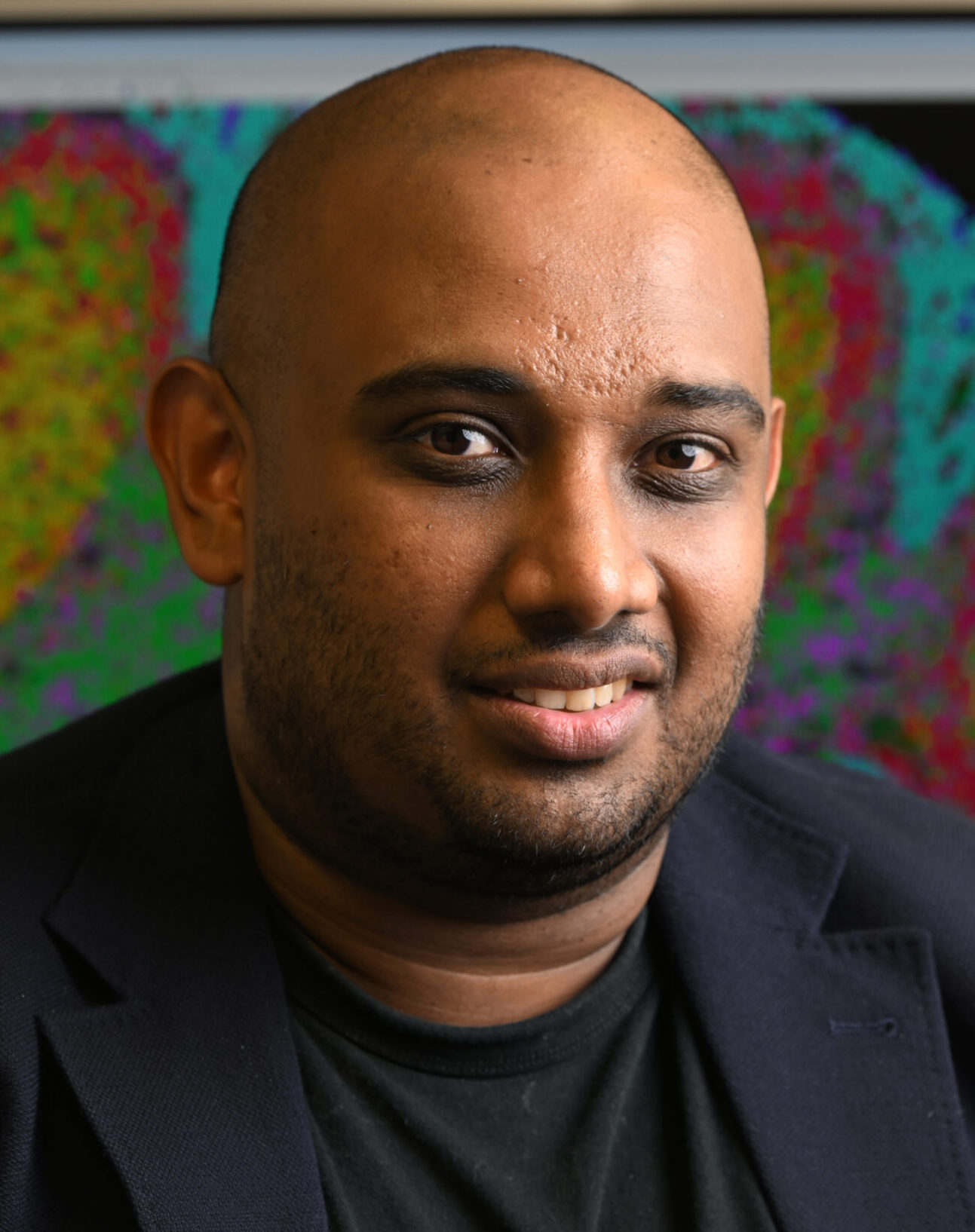
Keynote Speaker: Arutha Kulasinghe, PhD, University of Queensland
"Spatial Oncology: Mapping the Tumour Microenvironment One-cell, One-niche and One-Functional Unit at a Time"
Dr Arutha Kulasinghe is a Senior Research Fellow and leads the Clinical-oMx Lab at the University of Queensland. Dr Kulasinghe has pioneered spatial transcriptomics using digital spatial profiling approaches in the Asia-Pacific region, contributing to world-first studies for lung cancer, head and neck cancer, and COVID-19. His research aims to understand the underlying pathobiology by using an integrative multi-omics approach.
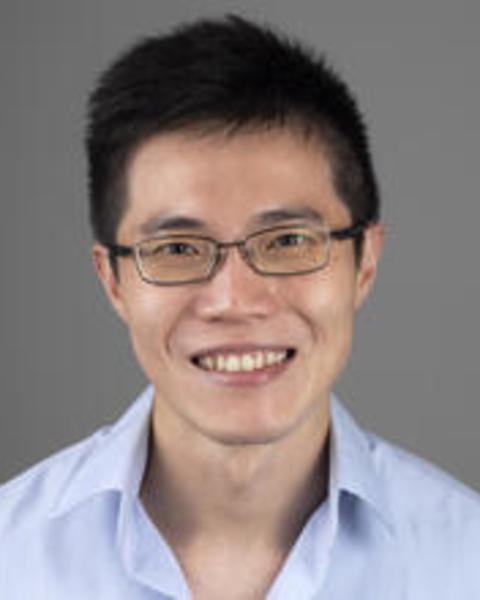
Harvard Medical School
Keynote Speaker: Sizun Jiang, PhD
"From Data to Discovery: Integration and Analysis of Multi-Modal Data"
We seek to develop and apply technologies (particularly revolving around high-dimensional tissue imaging) to address questions related to host-disease interactions in their native tissue context. By combining these methodologies with a systems approach to compute higher-order host-disease interactions, our ultimate goal is to understand disease mechanisms with the long-term goal of improving therapeutics. The lab is broadly focused on 3 main areas: “Viral Pathogenesis”, “Cancer Biology” and “Immune Dysregulation”, with the intention to learn fundamental principles that can be cross-applied between these pillars of research.
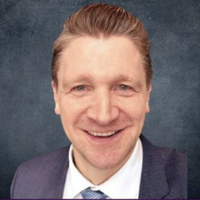
Chief Scientific Officer
BostonGene
Keynote Speaker: Joe Lennerz, MD, PhD
“Decoding the Language of Machine Learning”
Joe Lennerz, MD, PhD is the Chief Scientific Officer at BostonGene. Dr. Lennerz oversees the comprehensive product lifecycle management, data utilization and regulatory science for BostonGene, a leading provider of AI-driven molecular-genetic and immune profiling solutions. Before BostonGene, Dr. Lennerz served as the Associate Chief of Pathology and the Medical Director of the Center for Integrated Diagnostics at Massachusetts General Hospital (MGH) and Harvard Medical School.
Chakra Chennubhotla, PhD; PredxBio
Chakra Chennubhotla, PhD, is Co-Founder and Chief AI Officer of PredxBio. He earned his PhD in Computer Science from the University of Toronto, specializing in computer vision, machine learning, and artificial intelligence. Before launching PredxBio, Chakra was a tenured Associate Professor in the Department of Computational and Systems Biology at the University of Pittsburgh, where he helped develop pioneering technologies in spatial biology and computational pathology. With extensive experience spanning both academia and industry, Chakra has served as Principal Investigator on numerous NIH and NSF grants in areas ranging from bioimaging and molecular biophysics to systems biology and spatial intratumor heterogeneity. His work has been published in leading journals such as Science Translational Medicine and Nature Communications, and he is the inventor on multiple patents. Through PredxBio, he is advancing explainable AI–driven platforms to transform cancer research, clinical trials, and precision therapeutics.
Jessica Baumann, MD; Medical Director, Leica
Dr. Baumann is a board-certified anatomic and clinical pathologist who is currently Medical Director of Companion Diagnostics and Advanced Assays at Leica Biosystems. Prior to her current role, she was a pathologist and medical director at Roche Tissue Diagnostics and AstraZeneca. Her practice focus is companion diagnostic assay development and commercialization, and digital pathology algorithm development and clinical deployment.
Daniel Bergman, PhD; University of MD, School of Medicine
Sayani Bhattacharjee, PhD; Bruker Spatial Biology
Sayani Bhattacharjee, PhD, is the Field Application Scientist Supervisor for North America–East at Bruker Spatial Biology, where she leads scientific enablement and training across the company’s research platforms: nCounter®, GeoMx® DSP, CosMx™ SMI, and CellScape™. With a PhD in Cancer Biology and more than three years of hands-on expertise in spatial biology, she partners with scientists at leading institutions to drive experimental success and data-driven discovery. Sayani is a trusted advisor on both technical and analytical aspects of spatial workflows and has presented her work at institutional, regional, and international meetings. Passionate about the power of single-cell spatial resolution, she is dedicated to defining and disseminating best practices that advance the field. Her mission is to bridge cutting-edge spatial technologies with translational research, empowering scientists to extract meaningful insights from complex tissue architectures.
Kieran Campbell, PhD; Lunenfeld-Tanenbaum Research Institute
Kieran holds the Canada Research Chair in Machine Learning for Translational Biomedicine at the Lunenfeld-Tanenbaum Research Institute and is an Assistant Professor in the Departments of Molecular Genetics and Statistical Sciences, University of Toronto, and affiliate faculty at the Ontario Institute for Cancer Research and Vector Institute. Previously he earned his PhD in statistical genomics at Oxford University and was subsequently a Banting postdoctoral fellow at the University of British Columbia and BC Cancer Agency. His lab develops computational and machine learning methods for spatial and single-cell cancer genomics data.
Maureen Carey, PhD; Tempus
Diego Chowell, PhD;Assistant Professor, Ichan SOM
Lindsey Erion-Barner, PhD; Broad Institute of MIT
Lindsey Erion-Barner is a Senior Scientist at the Broad Institute of MIT and Harvard and leads the imaging team within the Spatial Technology Platform (STP), which provides spatial transcriptomics services as a specialized service facility to researchers. In previous work, Dr. Erion-Barner led development of high-throughput imaging methods for improved cancer prognostication. She is currently is leading high-plex transcriptomic assay implementation and development efforts at STP including optical pooled screens and 3D imaging assays with light sheet microscopy.
Alex Heinemann PhD; CEO Resolve Biosciences
Won Jin Ho, PhD, JHMI, Sidney Kimmel
Dr. Won Jin Ho is a physician-scientist focused on tumor microenvironment research. Dr. Ho obtained his bachelor’s and master’s degrees in Bioengineering at University of California, Los Angeles, medical education at Wayne State University School of Medicine in Detroit, MI, and his internal medicine research pathway residency at Case Western Reserve University in Cleveland, OH. Dr. Ho then completed his medical oncology fellowship at Johns Hopkins and joined the faculty at Johns Hopkins School of Medicine as a medical oncologist. Dr. Ho runs an NIH-funded laboratory, specializing in the use of high-parameter profiling methods on clinical biospecimens and conducting mouse model studies to understand mediators of immunotherapeutic response and resistance. Dr. Ho’s work has contributed to publications in Nature Cancer, Nature Immunology, JCI, JITC, Hepatology, among others, and awards from AACR, ASCO, Emerson Collective, and Harrington Discovery Institute. With his expertise in mass cytometry techniques and translational research, Dr. Ho has also been serving as the Scientific Director of Mass Cytometry at Johns Hopkins and the Associate Director of Technology for the Johns Hopkins Convergence Institute. Leveraging his expertise in preclinical and translational research, Dr. Ho is committed to understanding how tumor behavior is influenced by the surrounding microenvironment features to ultimately advance the field of cancer immunotherapy
Sizun Jiang, PhD HMS/BIDMC
Assistant Professor at the Center for Virology and Vaccine Research at Beth Israel Deaconess Medical Center and Harvard Medical School. My research combines my expertise in single-cell technology development and high-dimensional imaging modalities (training with Dr. Garry Nolan at Stanford), with my background in infectious diseases and cancer (training with Dr. Elliott Kieff at Harvard). Current work in my lab continues to innovate and apply novel methodologies to understand the microenvironments and host-disease interactions within diseased individuals, tissues and cells. Dissecting how these interactions occur across different scales will be paramount to mechanistic point-of-interventions.
Dr. Jiang has received awards from HHMI, the Leukemia and Lymphoma Society, the Gilead Research Scholar, the NIAID New Innovators DP2 Award, the Broad Next Generation Award, the Sanofi iAward, and the Fields Prize in Microbiology and Immunology at Harvard Medical School.
Medard Kaiza, PhD, UPMC Hillman Cancer Center
Medard Ernest Kaiza received his PhD in biomedical sciences from Nagasaki University, Japan, under Prof. Richard Culleton. His PhD work involved developing and characterizing a TLR2 agonist for treatment of liver stage malaria parasite infection. Soon after, he joined the NIH in Bethesda in the laboratory of Dr. Vega-Rodriguez for a 2-year postdoctoral training. Here, he investigated the mechanisms of complement evasion and spatial temporal gene expression in malaria parasites. He then joined the Bruno lab at the Hillman cancer center, Pittsburgh as a Postdoc associate where he investigates the immune contexture of TLS in cancer by using spatial multi-omics. His research interest is in developing clinically relevant biomarkers by using spatial multi-omics.
Gulpreet Kaur, PhD, Elucidate Bio
Dr. Kaur leads Biomarker Lab & Commercial Development at Elucidate Bio, focusing on bringing advanced spatial technologies to scientists in Pharma & Biotech. She earned her Ph.D. in Cell and Molecular Biology from the University of Wisconsin-Madison and has extensive experience in imaging technologies and spatial biology. Connect with Dr. Kaur to explore innovative spatial biology pipelines tailored for your program.
Smita Krishnaswamy, PhD, Yale University
Smita Krishnaswamy is an Associate Professor of Computer Science and Genetics at Yale University. She is also affiliated with the Program for Applied Mathematics and WTI Institute for Neurocomputation and Machine Intelligence at Yale and an affiliate member of the MILA Quebec AI Institute. Smita's lab works on fundamental deep learning and mathematical machine learning methods for accelerating discovery from biomedical and neuroscientific data. Her work features many methods for generative modeling, graph-based learning, visualization, dynamics modeling and optimal transport as well as multimodal integration of high dimensional data. She has applied her techniques to discovery from cellular, molecular, and imaging data from neuroscience, psychology, stem cell biology, cancer, and immunology. Smita obtained her Ph.D. from the University of Michigan in Computer Science. Smita's work has won several awards including the FASEB Early Career Excellence in Science Award, NSF CAREER Award, Sloan Faculty Fellowship, and Blavatnik Fund for Innovation. Smita teaches deep learning, unsupervised learning, geometry topology in ML and other courses at the intersection of CS and applied math. She also teaches special courses in computational genomics at CGSI (UCLA), CSHL, as well as being a mentor for the Yale SUMRY math REU program.
Arutha Kulasinghe, PhD, University of Queensland
Associate Professor Arutha Kulasinghe leads the Clinical-oMx Lab at the Frazer Institute, University of Queensland and is the Founding Scientific Director of the Queensland Spatial Biology Centre (QSBC) at the Wesley Research Institute. A/Prof Kulasinghe has pioneered spatial transcriptomics, proteomics, and interactomics in the Asia-Pacific region, contributing to world-first studies in lung cancer, head and neck cancer, and tissue atlasing studies of infectious diseases across pandemics. His research aims to understand the underlying pathobiology by using an integrative multi-omics approach. A/Prof Kulasinghe is supported by the MRFF, NHMRC, US DoD, Cancer Australia and numerous hospital and philanthropic organisations and is the 2023 recpient of the Cure Cancer "Researcher of the Year" and 2024 "Top Innovators List" by the Australian Magazine.
Wiem Lassoued, PhD, NIH/NCI
Dr. Lassoued is a staff scientist at the NIH/NCI, head of the Tumor Immune Microenvironment (TIME) Laboratory in the Center for Immuno-Oncology. The laboratory focuses on analyzing the tumor immune microenvironment (TIME) in pre-clinical and clinical samples from cancer patients treated with immunotherapeutic agents as monotherapies or in combination therapies. Many of which have led to the development of cancer vaccines such as PROSTVAC and immune checkpoint inhibitors. Dr. Lassoued has been investigating the effect of these treatments on the recruitment and activation of immune cells in the TIME and correlating these findings with patients’ response to therapy. She is also studying the spatial distribution of immune cells and their interaction with each other and with tumor cells to better understand the complexity of the TIME and to find new strategies for transforming the TIME into a tumor-hostile environment.
Jochen Lennerz, MD, PhD, CSO, BostonGene
Allison May, MD, University of Virginia
I am an Assistant Professor and surgeon-scientist in the Department of Urology at the University of Virginia. My clinical focus is in Urologic Oncology where I treat kidney and prostate cancer. I run a research lab studying kidney cancer with a focus on the molecular mechanisms of cancer progression and tumor/immune crosstalk. My lab aims to understand why certain kidney tumors become metastatic and how the immune system can be harnessed to prevent this. We utilize a variety of multi-omic techniques, largely focused on single cell spatial transcriptomics and proteomics, and in vitro/ex vivo experiments to better understand mechanisms of crosstalk between tumor cells and immune cells. Prior to UVA, I completed my research and clinical fellowships in urologic oncology at the University of Michigan and residency and medical training at Saint Louis University.
Claudio Gouveia Roque, PhD, New York Genome Center
Alison Scott, PhD, University of Maryland, Baltimore
Dr. Scott is an Assistant Professor in the Department of Microbial Pathogenesis at the University of Maryland, Baltimore. Her laboratory is working at the forefront of molecular imaging and pathogenesis. The group studies mechanisms through which dysregulation of lipid homeostasis contributes to disease across several models, ranging from the aging brain and sterile inflammation to pulmonary infections. By linking the spatially-regulated lipid landscape to underlying mechanisms in these models, her laboratory looks to develop novel interventional targets.
Maxwell Sherman, PhD, CTO, Serinus Biosciences
Maxwell Sherman is the Chief Scientific Officer of Serinus Biosciences, a biotechnology company bringing the power of protein interactomics to drug discovery. Dr. Sherman received his PhD in Computer Science from the Massachusetts Institute of Technology. His research focuses on integrating theoretical statistics, AI/ML models, and large-scale data generation to understand fundamental connections between genotype and phenotype. More recently, Dr. Sherman has been leading the development of novel experimental and computational methods to probe the physics of protein-protein interactions at massive scale.
Eldad Shulman PhD; NIH/NCI/CDS
Will Singleterry PhD, CEO
Alex Trevino, PhD, Enable Medicine
Dr. Trevino is Head of Research at Enable Medicine, a tech-bio company that connects molecular and cellular data to real-world patient outcomes at scale. He has made impactful contributions to diverse topics in cell biology, including gene regulation, development, and oncology. As a group leader, he is dedicated to connecting and motivating technical experts across disciplines and reaching across silos to expand opportunity in science.

